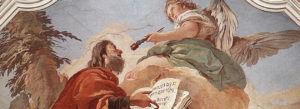Commemoration of Isaiah
July 6
With thanks and praise to God, we today remember the holy prophet Isaiah.
Among the writing prophets, surely none is greater or more beloved than Isaiah. He prophesied in the Southern Kingdom, particularly in Jerusalem, from about 740-701 BC. He was thus a contemporary of the other eighth-century-BC prophets: Amos, Hosea, an Micah. The corpus of Isaiah’s writing, however, is far larger than all of theirs combined. He wrote the longest prophecy in the entire canon.
Although Isaiah clearly addressed the contemporary issues of Judah’s idolatry and her attempt to substitute military savvy for trust in the Lord, his writings look beyond the current challenges toward the time of the promised Messiah and the fulfillment of His kingdom. This is a reminder that God in the flesh is the answer to the pressing problems that continue to surround and plague the people of God. Isaiah is cited more than any other prophet in the pages of the New Testament. He foretells the birth of the Messiah from a Virgin and His identity as Emmanuel, God with us (Isaiah 7). He plumbs the mystery of the divine person who becomes a human child (Isaiah 9). Christian art usually d epicts the ox and donkey at the manger in which the Christ Child lays because Isaiah proclaimed that the ox knew its owner and the donkey its master’s crib (Isaiah 1). He predicts the visit of the Magi (Isaiah 60). He foretells the ministry and work of St. John the Baptist (Isaiah 40). He foretells the mighty miracles that our Lord would perform among mankind—the blind seeing, the deaf hearing, the lame walking (Isaiah 35)—and these miracles largely transpiring in Galilee (Isaiah 9). He predicts and explains the purpose of the Passion of our Lord and His resurrection in amazing detail (Isaiah 53). He clearly foretells the ingathering of the Gentiles (Isaiah 2). He foresees a new heaven and a new earth where Eden would be restored (Isaiah 65).
epicts the ox and donkey at the manger in which the Christ Child lays because Isaiah proclaimed that the ox knew its owner and the donkey its master’s crib (Isaiah 1). He predicts the visit of the Magi (Isaiah 60). He foretells the ministry and work of St. John the Baptist (Isaiah 40). He foretells the mighty miracles that our Lord would perform among mankind—the blind seeing, the deaf hearing, the lame walking (Isaiah 35)—and these miracles largely transpiring in Galilee (Isaiah 9). He predicts and explains the purpose of the Passion of our Lord and His resurrection in amazing detail (Isaiah 53). He clearly foretells the ingathering of the Gentiles (Isaiah 2). He foresees a new heaven and a new earth where Eden would be restored (Isaiah 65).
His book justly has been called the Old Testament Gospel because of the comfort in which it abounds. Indeed, the prophet’s greatest task is to “comfort, comfort My people” (Isaiah 40). Martin Luther found great significance in particular in Isaiah 28 and God speaking of His strange or alien work (to terrify and to condemn) being always in the service of His proper work (to comfort and forgive). Isaiah also is a mighty teacher of divine monergism: “You have indeed done for us all our works!” (Isaiah 26).
According to tradition, the great prophet met a martyr’s death by being sawn in half. It is believed that Hebrews 11:37 refers to Isaiah: “They were sawn in two.” He surely has joined in the company of those who ceaselessly hear the song of the seraphim, “Holy, holy, holy!” (Isaiah 6).
Prayer: Lord God, heavenly Father, though the prophet Isaiah You continued the prophetic pattern of teaching Your people the true faith and demonstrating through miracles Your presence in creation to heal it of its brokenness. Grant that Your Church may see in Your Son, our Lord Jesus Christ, the final end-times prophet whose teaching and miracles continue in Your Church through the healing medicine of the Gospel and the Sacraments; through Jesus Christ, our Lord. Amen.
Weedon, William Celebrating the Saints 116-117
